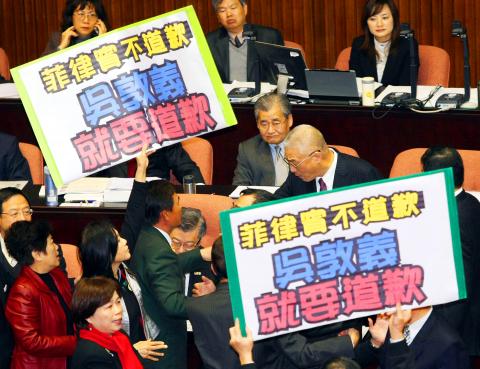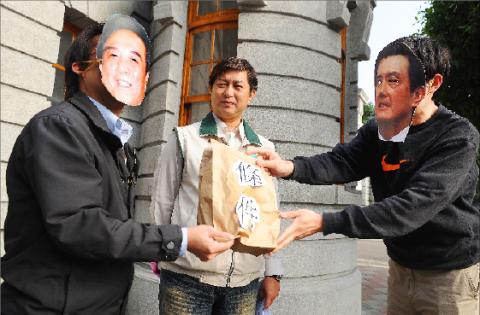President Ma Ying-jeou (馬英九) yesterday expressed displeasure with Manila over a diplomatic dispute that has chilled relations between the two countries, reiterating a demand that the Philippines apologize for deporting 14 Taiwanese fraud suspects to China earlier this month.
During a meeting with Philippine Senator Manuel Roxas, who was dispatched by Manila to mend fences with Taipei, at the Presidential Office in the morning, Ma said he had agreed to meet the special envoy “with a heavy heart.”
“Our government and the people are very angry with the improper expulsion of 14 of our citizens to China,” he said. “I am seeing you today because I think that long-term friendship and cooperation between the Republic of China [ROC] and the Philippines are important … How your country handles the matter from now on will serve as an important reference for how we develop bilateral ties.”

Photo: CNA
Ma said the Philippines made three major mistakes during the process.
While the Taiwanese were expelled from the Philippines, Philippine officials said they were extradited. They were also not sent to their native country — the ROC — a move Ma said seriously violated international law and practices.
The 14 Taiwanese were all ROC citizens who legally entered the Philippines with proper documents. However, the Philippine government claimed they did not have legal travel documents.

Photo: Chu Pei-hsiung, Taipei Times
“Your government officials lied openly,” Ma said.
Finally, Taiwanese authorities had obtained a restraining order from a Philippine court.
However, Manila ignored its legal provisions and “illegally sent our people to China,” Ma said.
“This is not what a democratic country should do,” he said.
Ma said Manila must be held responsible for the mistakes and apologize, a message he asked Roxas to convey to Philippine President Benigno Aquino III.
Meanwhile, the Ministry of Foreign Affairs said Taipei and Manila had achieved a seven-point consensus over the incident.
A “fact sheet” provided to media and dated Feb. 22, 1:23am, showed that Philippine authorities would take punitive action against officials who were involved in wrongdoing in deporting the 14 Taiwanese, which Taipei would interpret as “a kind of apology.”
The conclusion was one of the seven points drawn up during 11 hours of negotiations between Minister of Foreign Affairs Timothy Yang (楊進添) and Roxas on Monday.
Premier Wu Den-yih (吳敦義) and Yang both reiterated their call on Manila to apologize for the situation.
Asked at a press conference if the government would accept an apology by some Philippine officials for “negligence of duty” and regard it as a formal apology, Yang was noncommittal, only saying that it would depend on the results of an investigation into possible wrongdoing by the Philippine officials involved in the case.
“Some Philippine officials were involved in serious wrongdoing and engaged in deception in handling the case. We have demanded that an investigation be launched against those officials, and they have to apologize to us,” Yang said.
Yang called the press conference at 11am following Ma’s meeting with Roxas.
At about the same time that the press conference was being held, Wu told the legislature that the administration had not changed its position on demanding that the Philippines apologize.
“Minister Yang told the Philippines on Feb. 18 that they had to apologize to Taiwan if it sent a special envoy to Taiwan,” Wu said.
Wu on Sunday said an apology by Roxas was a necessary condition for the visit.
Roxas repeatedly said the Philippines “deeply regretted” the -incident during his talks with Yang and Ma, but came short of a full apology.
Democratic Progressive Party legislators shot back at Wu, accusing the government of agreeing to hold the meeting between Ma and Roxas despite Manila’s refusal to apologize.
DPP Legislator Chen Ting-fei (陳亭妃) said Wu appeared to be “out of the loop” regarding the diplomatic standoff between Taiwan and the Philippines.
“Ma should have never met Roxas. It’s degrading to our national dignity,” DPP Legislator Wong Chin-chu (翁金珠) said. “If the Philippines really wanted to apologize, [the Philippine] presidential palace should have just released a statement.”
In response, Wu said Roxas had proposed concrete suggestions and that both sides had agreed to make further efforts to resolve the situation.
The possibility exists that the case could be settled in a way that conforms to our demands and expectations, Wu said.
Yang said he had suggested that Ma meet Roxas at 2am yesterday, as Roxas had put forward measures to prevent similar cases from happening again.
According to the “fact sheet,” the “Philippines side is willing to sit down immediately to begin discussions for the establishment of a mechanism for cooperation and mutual assistance in dealing with these kinds of crimes, particularly those involving nationals of the two sides” and to launch “talks to determine the feasibility of beginning negotiations for an Economic Partnership Agreement.”
Yang said Taiwan had used the opportunity of Ma’s meeting with Roxas to “send a strong message” to the Philippines that it must apologize to Taiwan.
Also included in the fact sheet that Roxas conveyed was the message that “President Aquino views this recent unfortunate incident with great concern and desires to repair the damage this has caused in the relations between the two countries.”
In accordance with the fact sheet, Roxas said he “took cognizance of serious allegations by the Taiwan side of possible lapses and mishandling by Philippine immigration authorities” and that he “will report this directly to Aquino, including Taiwan’s strong demand for an apology.”
Roxas also assured Yang that “there was never any intention on the Philippines side to put at risk the long-standing good relations between the two countries.”
In related developments, political commentators blamed Ma for the diplomatic incident.
Lo Chih-cheng (羅致政), chief executive of Taiwan Brain Trust, said Ma’s expressions of displeasure with Manila were useless because his China policy had confused the international community to such an extent that its members believed Taiwan was part of China.
“China’s Taiwan policy is clear,” he said. “It wants to change the de facto ‘one China’ to de jure ‘one China.’”
Lai I-chung (賴怡忠), a researcher at Taiwan Thinktank, said Ma had no one to blame but himself, because he insisted that Taiwan and “the mainland” are both part of China.
Lin Cheng-yi (林正義), a researcher at the Institute of European and American Studies at Academia Sinica, urged the justice department of the Philippines to apologize and for the Ministry of Foreign Affairs to seek judicial assistance with Manila and other Southeast Asian countries.
Tung Li-wen (董立文), a professor at the Graduate School of Public Security at Central Police University, said he feared Association for Relations Across the Taiwan Strait Chairman Chen Yunlin (陳雲林) would use the 14 Taiwanese as a political tool and announce their extradition during his visit this week.
ADDITIONAL REPORTING BY VINCENT Y. CHAO

OPTIMISTIC: The DGBAS sharply upgraded its GDP growth estimate from 3.54 percent to 7.71 percent after the Taiwan-US trade agreement signing and given AI optimism The US imported more from Taiwan than China for the first time in decades, as US President Donald Trump’s tariffs reshape trade flows while a global boom in artificial intelligence (AI) fuels demand for tech products. US purchases of goods from China plunged almost 44 percent in December last year from 2024 to US$21.1 billion, US Department of Commerce data showed on Thursday. By contrast, shipments from Taiwan more than doubled during the same period to US$24.7 billion. The soaring Taiwanese shipments to the US reflect the huge expansion in supplies of chips and servers for AI companies, which has completely changed

NON-NEGOTIABLE: The US president’s action ran counter to one of the US’ ‘six assurances’ on not consulting China about arms sales to Taiwan, US lawmakers said US President Donald Trump’s admission that he is discussing arms sales to Taiwan with Chinese President Xi Jinping (習近平) is “alarming and a blatant violation of US policy and the six assurances,” US Representative Ro Khanna said on Tuesday. Trump on Monday said he would decide soon on whether to send more weapons to Taiwan, after Xi warned him not to do so. “I’m talking to him about it. We had a good conversation, and we’ll make a determination pretty soon,” Trump told reporters aboard Air Force One when asked about warnings raised by Beijing during a phone call with Xi over

The Central Election Commission has amended election and recall regulations to require elected office candidates to provide proof that they have no Chinese citizenship, a Cabinet report said. The commission on Oct. 29 last year revised the Measures for the Permission of Family-based Residence, Long-term Residence and Settlement of People from the Mainland Area in the Taiwan Area (大陸地區人民在台灣地區依親居留長期居留或定居許可辦法), the Executive Yuan said in a report it submitted to the legislature for review. The revision requires Chinese citizens applying for permanent residency to submit notarial documents showing that they have lost their Chinese household record and have renounced — or have never

US and Chinese fighter jets briefly faced off above waters near the Korean Peninsula this week, Yonhap News agency reported, marking a rare confrontation in that area between the two superpowers. About 10 US fighter jets on Wednesday departed an airbase in Pyeongtaek, South Korea, for drills above international waters off South Korea’s western coast, the news outlet cited unidentified military sources as saying. While the US planes did not enter China’s air defense identification zone, Beijing scrambled planes as they neared that region, the report said. “The Chinese People’s Liberation Army organized naval and air forces to monitor and effectively respond